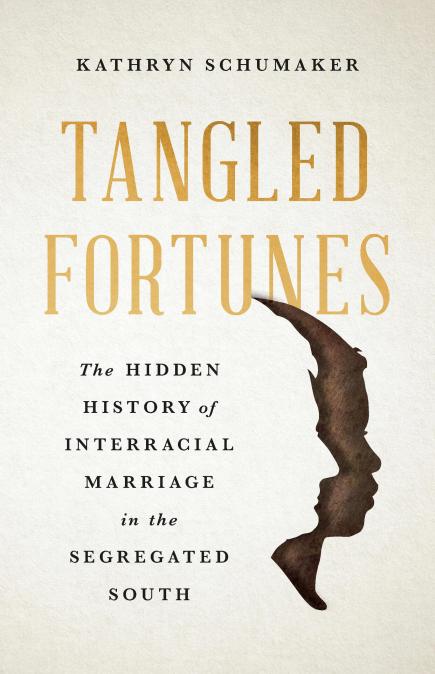Shopping Cart
Tangled Fortunes
The Hidden History of Interracial Marriage in the Segregated South
Description
A “brilliantly researched and surprising” (Hendrik Hartog, Princeton University) history of Southern segregationists’ long war against interracial relationships, and the century-long fight to restore the freedom to love, marry, and inherit
Interracial marriage was already illegal in some American colonies as early as the 1690s. But long before the Supreme Court declared that interracial couples had the right to marry in 1967, these families were far from rare. It took decades of hard work by Southern lawmakers and judges to create the illusion that they were, as Tangled Fortunes reveals in this new history of the rise and fall of the domestic color line.
In Tangled Fortunes, historian Kathryn Schumaker narrates how the prohibition of interracial marriage became a priority in segregated states like Mississippi. To prevent white wealth falling into Black hands, state and local authorities papered over the reality of interracial relationships, steered inheritances away from those who did not pass as white, and hardened the lines of racist exclusion. But they could neither erase the longer history of interracial relationships nor suppress the inheritance claims of biracial descendants dating back to the era of slavery.
Tangled Fortunes sheds new light on the ways that interracial families overcame racist laws, uncovered closely kept Southern secrets, and battled to reclaim Black wealth—a fight that continues to this day.
Interracial marriage was already illegal in some American colonies as early as the 1690s. But long before the Supreme Court declared that interracial couples had the right to marry in 1967, these families were far from rare. It took decades of hard work by Southern lawmakers and judges to create the illusion that they were, as Tangled Fortunes reveals in this new history of the rise and fall of the domestic color line.
In Tangled Fortunes, historian Kathryn Schumaker narrates how the prohibition of interracial marriage became a priority in segregated states like Mississippi. To prevent white wealth falling into Black hands, state and local authorities papered over the reality of interracial relationships, steered inheritances away from those who did not pass as white, and hardened the lines of racist exclusion. But they could neither erase the longer history of interracial relationships nor suppress the inheritance claims of biracial descendants dating back to the era of slavery.
Tangled Fortunes sheds new light on the ways that interracial families overcame racist laws, uncovered closely kept Southern secrets, and battled to reclaim Black wealth—a fight that continues to this day.
Newsletter Signup
By clicking ‘Sign Up,’ I acknowledge that I have read and agree to Hachette Book Group’s Privacy Policy and Terms of Use
Praise
“For generations, Mississippi politicians thundered about racial purity, but experience on the ground was always more complicated. In this marvelous synthesis of legal and social history, Kathryn Schumaker digs beneath the rhetorical surface, exposing the complex, shifting intersection of race, sex, and marriage in the Magnolia State.”
—James T. Campbell, author of Middle Passages
“This deeply researched, beautifully written book uncovers a forgotten history that changes how we see the Jim Crow South. As Schumaker shows, legal efforts to police the color line did not eliminate interracial marriage. Following the compelling stories of those couples and their efforts to keep their families together, this book reveals the possibilities of human agency and the limits of formal law in dictating the terms of everyday life. This is a must read.”
—Laura F. Edwards, Princeton University
“Tangled Fortunes is a brilliantly researched and surprising work of historical reconstruction. Kathryn Schumaker illuminates how multiracial families survived and sometimes flourished across a century of Mississippi history, from Reconstruction until the dawn of the civil rights era. The brutality and ugliness of the racial regime and of white supremacy are never forgotten, but the Mississippi Schumaker reveals, filled with hesitant legislators and frustrated prosecutors, and couples and families that insisted on living lives on their own terms, is quite different than the Mississippi we thought we knew. Couples sometimes hid in the deep shadows of the law, or their lawyers mobilized formalisms and contradictions to escape prosecution and imprisonment. But sometimes they lived in quiet but almost open rebellion, and local communities colluded with interracial couples as often as they enforced a racist regime. Maintaining laws against miscegenation was hard work. The racial regime was cruel and harsh and violent, but it was never robust enough to achieve its apparent goal of sexual segregation.”
—Hendrik Hartog, professor emeritus, Princeton University
“A creative, insightful, thoroughly researched history. Told through the gripping stories of countless couples fighting to preserve their unions, Schumaker shows how their resistance led to a surprising level of toleration for interracial cohabitation, while also documenting its limits in stark terms. Not only did authorities repeatedly criminalize those relationships and penalize some couples severely, the white men who governed the segregated South protected their own wealth and diminished that of African Americans by relentlessly denying the inheritance claims of Black members of interracial families. Through Schumaker’s deft narratives, interracial marriage becomes a way to understand anew the intersection of individual experience and the social order.”
—Michael Grossberg, professor emeritus, Indiana University
